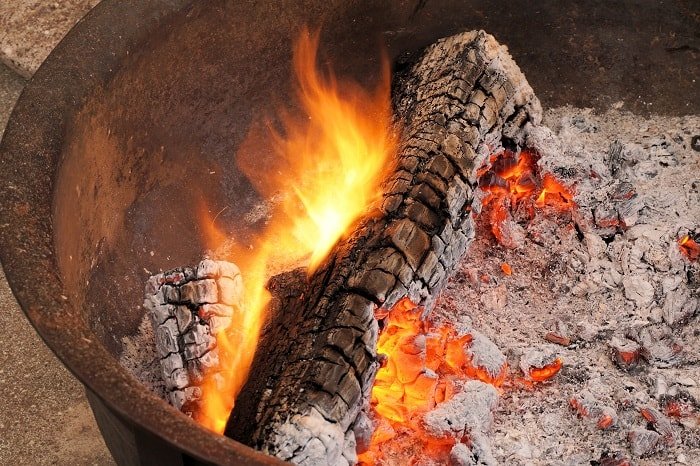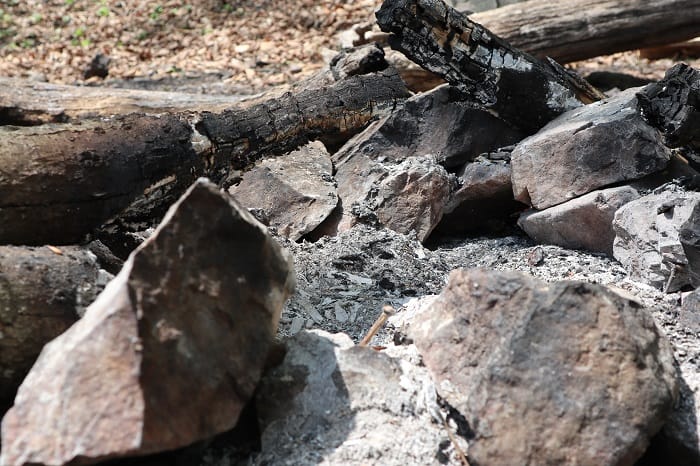Last Updated on October 29, 2022
Composting is a great way to not only help the planet by reducing your waste but also to help your garden grow and thrive. There are a lot of things you can include in your compost, depending on what your diet is and what is your lifestyle. But there is one thing you may not have known you could include. Maybe you had been throwing it out all along! Today we are going to talk about charcoal ash and wood ashes in compost.
Keep in mind that we are going to discuss the use of good quality hardwood ashes. That means, not coming from barbecue grills, cardboard, plywood, painted or pressure-treated woods, etc. These do not have any real agricultural use and should be discarded.
What are Wood Ashes Made Of
Burning wood leaves two types of waste: ash and charcoal, on top of extra pieces of wood that have not burnt completely. Ash is the grey powder that is extra fine and delicate. Charcoal is the black remains. Together we will reference them as “wood ashes”.
Why Is it Good for Compost?
Composition
Wood ashes contain minerals that can help replenish the soil and improve its quality. They have a ton of phosphorus and potassium – specifically they are made up of 10% potassium and 1% phosphorus. If your soil is in need of these, then you are in luck!
You will be also adding micronutrients, like iron, manganese, boron, copper, and zinc. All of these will make their way to your plants by the microbes present in your compost.
Increased Surface Area and Oxygen Pockets
Wood ashes are an incredible way of adding nutrient holding capacity to your compost. It is so porous that just 1 gram of charcoal has about 10% the surface area of a football field.
By adding it, you will include a lot of oxygen pockets into your compost, that means life for your beautiful microbes. This adsorption -referring to gas and not liquid- is great for your plants!
Increasing the pH in your Compost
Another great thing that wood ashes will do for your garden is increasing the pH of the soil. As they are composed of 25% calcium carbonate, the compost will turn more alkaline if you include them in it.
If you have a lot of vegetable waste in your compost, which is very acidic, adding wood ash will neutralize that. Be mindful of your soil’s composition, though, and do not add too much of it if your soil is already alkaline enough.
Usually, areas that experience regular heavy rainfall have highly acidic soils that can benefit from the addition of an alkaline element to balance that out in place of lime.
Good quality wood ashes have half or even 2 thirds of the calcium carbonate that lime has and are just as effective in this purpose.
Note that ideal soil pH is slightly acidic by nature. Swinging it very far in any direction will cause the soil to lock up on specific nutrients and we want it to have the widest range possible. In high concentrations, this could also inhibit plant growth.
This also depends, however, on what plants you are growing. Some plants have very specific soil needs and you should adjust it depending on that.
Although you should not directly apply it to your soil because of these possible issues, you could do use it as a repellent for slugs and snails.
How NOT to Use Wood Ashes in Your Garden
First of all, do not use them in excess. Apart from turning your soil more alkaline, they can contain trace amount of heavy metals. This effect can be mitigated by keeping a healthy microbial environment in your compost and soil.
Do not use them if your compost will go near acid-loving plants like blueberries or azaleas or newly planted seeds and seedlings. It can be detrimental.
FAQ’s
Is it good to add wood ashes to compost?
It's perfectly fine. It will help break down the lignin and cellulose, and it will add phosphorous, potassium, sulfur and other nutrients that can be beneficial in a compost pile.
You need to know what kind of ash you are talking about. The ash in question is a product made by heating wood with the intent of separating the lignin from the cellulose. It has been called “wood ash” or “biosolids.
Wood ashes are commonly used as a soil amendment, but they may not be the best choice for garden compost. It’s possible to use wood ash as a soil conditioner, but not as a fertilizer. The wood ashes from a wood-burning stove are considered a waste product, and often end up in landfills or incinerators.
It is also one of the most effective ways to increase your compost temperature without using heat. When composting, it is important to keep the compost pile as hot as possible. If you don't have access to a wood stove or fireplace, a layer of ash in the center of your compost pile will help keep it hot.
Wood ash is a very good mulch material. It helps to maintain the soil's pH balance and retains moisture. Some gardeners use wood ash as fertilizer for their vegetable gardens, and some use it to help prevent weeds from growing in their lawns. Wood ash also makes a great soil amendment. You can spread it on your lawn or garden beds to keep your soil well-mulched and acidic.
Is it hard?
Anyone can recycle wood ash as an additive to your compost as it is easy to make a simple compost bin from an old wooden box or barrel. You will need to buy composting material such as shredded newspaper, grass clippings and leaves. Then you just need to mix these materials with the wood ash. The wood ash can be bought in bulk or in bags.
What time of the year is best for it?
The best time to add wood ash to your garden is during the autumn, as this is when it will have the greatest impact on your plants.
How much wood ash should you put in a garden?
When it comes to adding ash to your garden, there are two questions to answer: how much and when. Ash is very versatile in the garden, as it’s used for mulch, compost, soil conditioner, fertilizer, pest deterrent and more. You can add ash to any of these uses and still keep your garden healthy and beautiful.
It's not good for plants to have lots of nitrogen (ammonia) in the soil. Ammonia is toxic to many plants, and also has a bad odor, so it doesn't really help them grow either. If you're going to put wood ash in your garden, you'll want to avoid using high-nitrogen fertilizers like ammonium sulfate or urea.
The amount of wood ash you use depends on the size of your property. You want to apply enough ash to give your plants the nutrients they need, but not so much that you overload them with ash.
Some Recommendations for Using Wood Ashes in Your Garden
1 – We recommend you perform a pH test on your soil before considering adding any wood ashes to your compost. Bearing in mind this information, you should only add a small amount unless your soil is naturally acidic. If it already is alkaline, then avoid them.
2 – Do not burn anything specifically to use the ashes as compost. The gases burning emits are harmful to the environment and therefore will counteract the good things you are doing for the soil. There are other great and easy ways to obtain organic compost.
3 – If the weather is windy, avoid using wood ash as it can blow and scatter everywhere. And on that note, whenever handling it make sure to wear a face mask, eye protection, and gloves. Its alkaline nature can irritate your skin and its particles are easily inhaled.
4 – Use a shovel or scoop to place the ashes into a bag in order to transport it. This way you can also keep some of it to use in the future if you do not need it right away. You could even give another friendly gardener some!
5 – Do not add a whole heap of the ashes to the compost at once. Add it by layers and always put a brown layer on top of your ash. Also, make sure to turn it every time you add new items to keep it healthy.
6 – This one is very important: You should only use ash that comes from untreated wood. This means that ash coming from items like cardboard, stained wood or other substances can contain harmful chemicals and are not beneficial for your garden.
7 – Also avoid using ash from black walnut trees.
8 – Do not mix the wood ash with nitrogen fertilizer. When combined, a reaction can occur that will release ammonia gas. It smells awful!
What do you think? Have you been using wood ash correctly or not? Would you consider using it in the future? Post a picture of your beautiful garden below and tell us how wood ash helped your plants!

Josephine is an enthusiastic gardener who loves to spend her spare time tending to her garden. She is passionate about growing her own food, and aspires to one day have her own vegetable garden. Josephine is also an animal lover and often takes in stray cats and dogs. She enjoys spending time with her pets in the garden, and is often seen playing with them or watering her plants. Josephine is an avid reader and enjoys learning about new gardening techniques and plants. She is always looking for ways to improve her garden and make it more beautiful. She is a great friend, always willing to lend a helping hand when needed. Josephine‘s passion for gardening and love of animals make her a wonderful addition to any garden.


